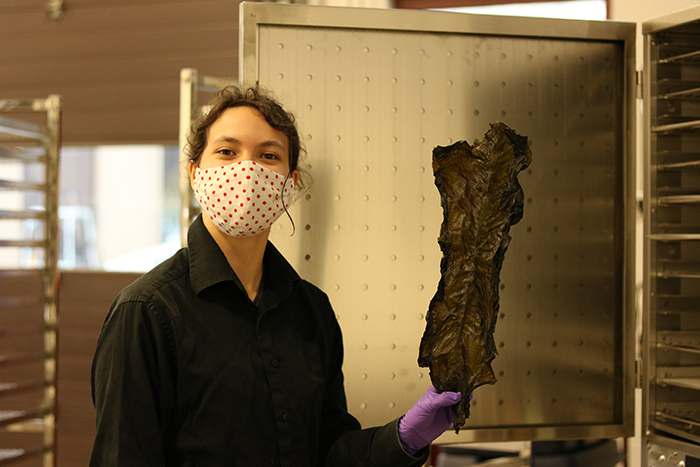NIC student research assistant Avalon Kline-Smith holds up a piece of dried Alaria marginata, also known as Pacific wakame or winged kelp.
NIC’s Centre for Applied Research, Technology and Innovation is partnering with Cascadia Seaweed Corp. (CSC) to determine how to efficiently turn cultivated seaweed from raw biomass into shelf-friendly food products.
The purpose of the project, supported by a $25,000 NSERC Engage Grant, is to examine how to optimize food production with a focus on primary processing. The goal is to identify and assess equipment, methodology and product formulations for developing shelf-stable seaweed products out of raw biomass.
“More people are looking for plant-based proteins that taste good and are good for the environment, and seaweed delivers on both,” said Liam Collins, head of programs at Cascadia Seaweed. “The challenge is conducting the harvest and primary processing in a way that provides the most flexibility for secondary processing — when the seaweed is made into products that can go on the shelves at grocery stores.”
NIC researchers will take frozen raw kelp from Cascadia Seaweed and run it through a series of processing trials, evaluating steps such as washing, blanching, drying and packaging. The researchers will also map the processing value stream from the time the seaweed is landed at a primary processing facility until it is ready for shipment to secondary processing, in turn helping CSC identify processing pinch points and efficiencies.
The project will take place in NIC’s aquaculture wet lab space at the Campbell River campus and will use some of the new commercial food processing equipment purchased through a recent NSERC Applied Research Tools and Instruments grant.
“We are very excited to partner with Cascadia Seaweed on this research that focuses on the processing side of seaweed aquaculture,” said Naomi Tabata, manager of CARTI. “Developing local seaweed processing capacity will be critical for the success of the industry on Vancouver Island, and CARTI lead researcher Allison Byrne is working closely with Cascadia to ensure the processing trials will have a direct benefit to their operations.”
Findings from the research will be used by CSC at their primary processing facility in Port Alberni — The Dock+.
“The seaweed sector is the next big thing in aquaculture in British Columbia,” said Collins. “This research will help rapidly develop the techniques and processes for a new supply of delicious and nutritious seafood right here on Vancouver Island. We are building a future and the large-scale cultivation of seaweed is improving ocean ecosystems while also providing meaningful work for people in BC’s coastal communities.”
Learn more about NIC’s research projects at www.nic.bc.ca/research.
Media Contact C: 250-207-6946 media@nic.bc.ca